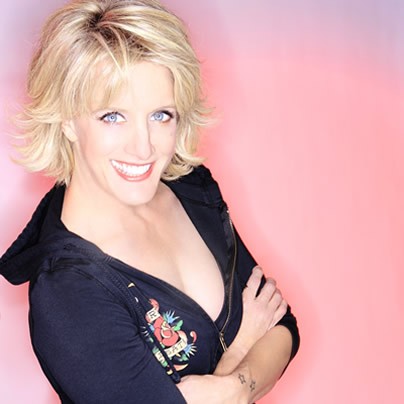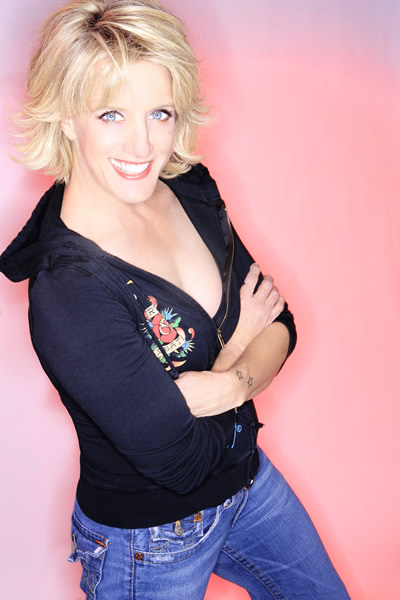Arts & Entertainment
Laughing all the way
Westenhoefer on her divorce, Birchmere return and Jodie Foster


Suzanne Westenhoefer (Photo by Adam Bouska)
For one of her first shows this year, comedian Suzanne Westenhoefer cannot assure her audience she will stick to a certain theme or what kind of jokes she will make. She doesn’t even have a name for her current tour.
However, she does promise that straight or gay, boy or girl, attendees will laugh.
Westenhoefer comes to the Birchmere (3701 Mount Vernon Ave., Alexandria) Friday night, bringing with her personal stories that audiences can relate to and laugh about.
“Because the act I do is very truthful, very personal, my show is changing hourly,” she says. “If something changes in my life that makes the story not true, the show changes. It’s not like a written script.”
The blend of honesty and often self-deprecating humor is what brings audiences back year after year, says Michael Jaworek, Birchmere promoter, who has been booking Westenhoefer for more than 15 years.
“Her audience is very devoted and follows her,” he says. “She is funny. Her humor is insightful. A lot of her material deals with gay life, or rather lesbian life. She speaks to and for the majority of her audience.”
Suzanne Westenhoefer
February 1
The Birchmere
3701 Mount Vernon Ave.
Alexandria, Va
Tickets are $54.50
Westenhoefer does know that a bulk of her show will deal with recovering from divorce and entering the dating world for the first time in years. Through this process, she’s learned a few new things about herself.
“I suck at dating,” she says. “I don’t date, I don’t know how.”
A little less than a year ago, Westenhoefer divorced long-term partner Jennifer Houston, whom she married in 2008 before Proposition 8 was voted on in California. Through the transition, she’s learned a lot of new things about herself.
“I thought I would be fine, apparently not,” she says. “I didn’t know how to feed myself. I hadn’t cooked for myself since I moved in with my first partner when I was 21.”
But she says despite the bumps and challenges in her new life, there are so many great and new people to meet and that everyone should “go out, be nice, buy someone a cocktail and meet somebody.” She’s currently exclusively seeing a woman whom she calls “tall girl” in order to respect her privacy.
The stage to Westenhoefer is an open diary, and even when the story is tragic in nature, she always tries to make it comedic.
“I see what everybody is thinking, what needs to be said,” she says. “I’m getting everybody off the hook by saying it. I’m giving them a chance to laugh at tragedy that befalls them all.”
Growing up in the heart of Amish country in Pennsylvania, and coming out right when the AIDS crisis was starting in 1981, Westenhoefer has had plenty of stories to tell. But the act of sharing her personal narrative has its roots in something deeper and older.
“My grandfather was the same way,” she says. “He was that kind of person who goes to the store to get milk and bread, come back and have a fantastic funny story about it.”
On stage, Westenhoefer is not afraid to say whatever is on her mind.
“Once my sister told me she thinks she might be gay, but asked me not to tell anybody,” she says. “What did I do? I went right on stage and said ‘So, my sister thinks she’s gay.’”
This has not gotten her in trouble with her family so far, she claims, because they know it is “out of love.”
Westenhoefer began her stand-up career at the end of 1990, when a friend dared her to go on stage while she was working as a New York bartender. However, she did not need anyone to dare her to be honest and talk about gay life.
“My opening line was I am the only gay comedian you’re going to see tonight,” she says.
Though her first time on stage didn’t go well (by her own admission), her career took off through the ‘90s. In 1991, she became the first lesbian comic to appear on television, when she was on an episode of “Sally Jessy Raphael” called “Breaking the Lesbian Stereotype: Lesbians Who Don’t Look Like Lesbians,” and then went on to be the first openly gay comic to host an HBO Comedy Special in 1994.
Being on television created an opportunity to start a conversation, she says.
“It was a way to tell people not to panic, we aren’t killing babies,” Westenhoefer says. “This has always been and always will be.”
This is not the first time Westenhoefer has been a force for change. She says in high school she formed a group to ban dodge ball. She says activism is in her blood and that she and her family always were political
While still blunt and honest with her audience, Westenhoefer says things have certainly changed since she began. Westenhoefer no longer uses her original opening line.
“I used to do shows in straight clubs and I literally would say I was lesbian in the beginning of every show,” she says. “It’s definitely gotten to be a different show. It doesn’t have to be gay gay gay gay.”
Recent events, such as Jodie Foster’s speech at the Golden Globes and Barack Obama’s speech at his second inauguration, she says mark the change in attitudes toward the LGBT community.
When she came out at 19, Westenhoefer says it was a scarier time period. There was more violence against the community. However, most of her friends and family were supportive.
Now she finds it amazing that people like Foster can go on international television and discuss their sexuality with the world.
“I am very excited for her,” Westenhoefer, who’s met Foster three times, says. “She is a very shy, very private woman. I am very proud of her. To get up in front of an international audience and tell this, it’s amazing.”
Despite leaving the much warmer West Coast to do so, Westenhoefer says she’s always glad to return to the D.C. area.
“I love D.C. for several reasons,” she says. “First of all people will come out for a show even if there is an ice storm. They have southern hospitality, they are political and they want to be entertained. It is the perfect storm for comedy.”
Jaworek is happy to have her back because, “Suzanne is a very funny woman period.”
Even though she shares the experiences of a lesbian, Westenhoefer insists that, “the boys are welcome. It is not just for girls. It’s a show for straights, for gays, and if they wanna come, I promise they’ll laugh.”
Books
Love or fear flying you’ll devour ‘Why Fly’
New book chronicles a lifetime obsession with aircraft

‘Why Fly’
By Caroline Paul
c. 2026, Bloomsbury
$27.99/256 pages
Tray table folded up.
Check. Your seat is in the upright position, the airflow above your head is just the way you like it, and you’re ready to go. The flight crew is making final preparations. The lights are off and the plane is backing up. All you need now is “Why Fly” by Caroline Paul, and buckle up.

When she was very young, Paul was “obsessed” with tales of adventure, devouring accounts written by men of their derring-do. The only female adventure-seeker she knew about then was Amelia Earhart; later, she learned of other adventuresome women, including aviatrix Bessie Coleman, and Paul was transfixed.
Time passed; Paul grew up to create a life of adventure all her own.
Then, the year her marriage started to fracture, she switched her obsession from general exploits to flight.
Specifically, Paul loves experimental aircraft, some of which, like her “trike,” can be made from a kit at home. Others, like Woodstock, her beloved yellow gyrocopter, are major purchases that operate under different FAA rules. All flying has rules, she says, even if it seems like it should be as freewheeling as the birds it mimics.
She loves the pre-flight checklist, which is pure anticipation as well as a series of safety measures; if only a relationship had the same ritual. Paul loves her hangar, as a place of comfort and for flight in all senses of the word. She enjoys thinking about historic tales of flying, going back before the Wright Brothers, and including a man who went aloft on a lawn chair via helium-filled weather balloons.
The mere idea that she can fly any time is like a gift to Paul.
She knows a lot of people are terrified of flying, but it’s near totally safe: generally, there’s a one in almost 14 million chance of perishing in a commercial airline disaster – although, to Paul’s embarrassment and her dismay, it’s possible that both the smallest planes and the grandest loves might crash.
If you’re a fan of flying, you know what to do here. If you fear it, pry your fingernails off the armrests, take a deep breath, and head to the shelves. “Why Fly” might help you change your mind.
It’s not just that author Caroline Paul enjoys being airborne, and she tells you. It’s not that she’s honest in her explanations of being in love and being aloft. It’s the meditative aura you’ll get as you’re reading this book that makes it so appealing, despite the sometimes technical information that may flummox you between the Zen-ness. It’s not overwhelming; it mixes well with the history Paul includes, biographies, the science, heartbreak, and exciting tales of adventure and risk, but it’s there. Readers and romantics who love the outdoors, can’t resist a good mountain, and crave activity won’t mind it, though, not at all.
If you own a plane – or want to – you’ll want this book, too. It’s a great waiting-at-the-airport tale, or a tuck-in-your-suitcase-for-later read. Find “Why Fly” and you’ll see that it’s an upright kind of book.
The Blade may receive commissions from qualifying purchases made via this post.
Theater
Out actor Kevin Cahoon on starring role in ‘Chez Joey’
Arena production adapted from Broadway classic ‘Pal Joey’

‘Chez Joey’
Through March 15
Arena Stage
1101 Sixth St., S.W.
Tickets start at $93
Arenastage.org
As Melvin Snyder in the new musical “Chez Joey,” out actor Kevin Cahoon plays a showbiz society columnist who goes by the name Mrs. Knickerbocker. He functions as a sort of liaison between café society and Chicago’s Black jazz scene circa 1940s. It’s a fun part replete with varied insights, music, and dance.
“Chez Joey” is adapted from the Broadway classic “Pal Joey” by Richard Rodgers and Lorenz Hart. It’s inspired by John O’Hara’s stories based on the exploits of a small-time nightclub singer published in The New Yorker.
A warm and humorous man, Cahoon loves his work. At just six, he began his career as a rodeo clown in Houston. He won the Star Search teen division at 13 singing songs like “Some People” from “Gypsy.” He studied theater at New York University and soon after graduating set to work playing sidekicks and comedic roles.
Over the years, Cahoon has played numerous queer parts in stage productions including “Hedwig and the Angry Inch,” “La Cage aux Folles,” “Rocky Horror” as well as Peanut in “Shucked,” and George the keyboardist in “The Wedding Singer,” “a sort of unicorn of its time,” says Cahoon.
Co-directed by Tony Goldwyn and the great Savion Glover, “Chez Joey” is a terrific and fun show filled with loads of talent. Its relevant new book is by Richard Lagravenese.
On a recent Monday off from work, Cahoon shared some thoughts on past and current happenings.
WASHINGTON BLADE: Is there a through line from Kevin, the six-year-old rodeo clown, to who we see now at Arena Stage?
KEVIN CAHOON: Anytime I want to land a joke in a theater piece it goes back to that rodeo clown. It doesn’t matter if it’s Arena’s intimate Kreeger Theatre or the big rodeo at the huge Houston Astrodome.
I was in the middle stadium and there was an announcer — a scene partner really. And we were doing a back and forth in hopes of getting laughs. At that young age I was trying to understand what it takes to get laughs. It’s all about timing. Every line.
BLADE: Originally, your part in “Chez Joey” Melvin was Melba who sings “Zip,” a clever woman reporter’s song. It was sort of a star feature, where they could just pop in a star in the run of “Pal Joey.”
CAHOON: That’s right. And in former versions it was played by Martha Plimpton and before her Elaine Stritch. For “Chez Joey,” we switched gender and storyline.
We attempted to do “Zip” up until two days before we had an audience at Arena. Unexpectedly they cut “Zip” and replaced it with a fun number called “I Like to Recognize the Tune,” a song more connected to the story.
BLADE: Wow. You must be a quick study.
CAHOON: Well, we’re working with a great band.
BLADE: You’ve played a lot of queer parts. Any thoughts on queer representation?
CAHOON: Oh yes, definitely. And I’ve been very lucky that I’ve had the chance to portray these characters and introduce them to the rest of the world. I feel honored.
After originating Edna, the hyena on Broadway in “The Lion King,” I left that to do “Hedwig and the Angry Inch” as standby for John Cameron Mitchell, doing one show a week for him.
Everyone thought I was crazy to leave the biggest musical of our time with a personal contract and getting paid more money that I’d ever made to get $400 a week at the downtown Jane Street Theatre in a dicey neighborhood.
At the time, I really felt like I was with cool kids. I guess I was. And I never regretted it.
BLADE: When you play new parts, do you create new backstories for the role?
CAHOON: Every single time! For Melvin, I suggested a line about chorus boys on Lakeshore Drive.
BLADE: What’s up next for Kevin Cahoon?
CAHOON: I’m about to do the New York Theatre Workshop Gala; I’ve been doing it for nine years in a row. It’s a huge job. I’ll also be producing the “Cats: The Jellicle Ball” opening on Broadway this spring; it’s a queer-centric uptown vogue ball with gay actor André de Shields reprising his role as “Old Deuteronomy.”
BLADE: There’s a huge amount of talent onstage in “Chez Joey.”
CAHOON: There is. I’m sharing a dressing room with Myles Frost who plays Joey. He won accolades for playing Michael Jackson on Broadway. We’ve become great friends. He’s a miracle to watch on stage. And Awa [Sal Secka], a D.C. local, is great. Every night the audience falls head over heels for her. When this show goes to New York, Awa will, no doubt, be a giant star.
BLADE: Do you think “Chez Joey” might be Broadway bound?
CAHOON: I have a good feeling it is. I’ve done shows out of town that have high hopes and pedigree, but don’t necessarily make it. “Chez Joey” is a small production, it’s funny, and audiences seem to love it.

The Capital Pride Alliance held the annual Pride Reveal event at The Schuyler at The Hamilton Hotel on Thursday, Feb. 26. The theme for this year’s Capital Pride was announced: “Exist. Resist. Have the audacity!”
(Washington Blade photos by Michael Key)























-

 India5 days ago
India5 days agoActivists push for better counting of transgender Indians in 2026 Census
-

 Advice5 days ago
Advice5 days agoDry January has isolated me from my friends
-

 National5 days ago
National5 days agoAfter layoffs at Advocate, parent company acquires ‘Them’ from Conde Nast
-

 District of Columbia5 days ago
District of Columbia5 days agoCapital Pride reveals 2026 theme


















